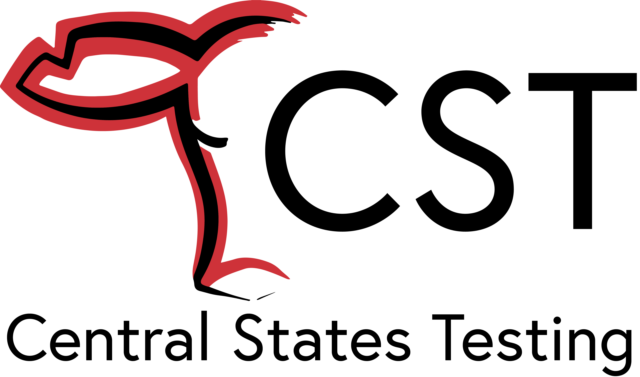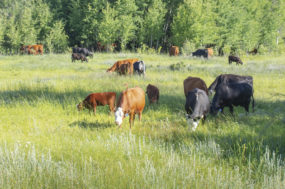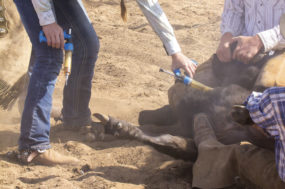We purchased the place just before Thanksgiving, so work began on the house first. It's pretty difficult to build a fence during a Montana winter. The day we moved in, the advertised "new" septic shut down. Three pipes backed up afterwards. The heat didn't work until we put in a new boiler, pipeline and fuel tank. Some of the house hadn't been ducted for heat. As we gutted things out, we found a mouse infestation that rivaled the tale of the Piped Piper. It seemed one thing after another unraveled. However, by spring, everyone had a bedroom door, the toilets flushed and water was only coming out of faucets.
The fences received attention as soon as the weather permitted. Every one needed to be rebuilt or fixed. Several months were spent fencing, building a corral and getting the water going. The irrigation equipment needed repair, so we purchased necessities for water. We seeded some pastures. The kids faithfully whacked weeds.
During this time, we decided even though prices were high, we'd buy a few broken mouth cow-calf pairs. The plan was to fatten them up and then resell them in a few months. The land would be grazed this way, and the profit would help fund our renovation.
If only plans work out the way we want.
The day we sold our cow-calf pairs was the day the stock market crashed. News of the crash hit the sale yard a mere two hours before our cattle went through.
Most of you know that when the stock market crashes, the cattle market tanks. That day was no different.
It could've been worse, but it was not anticipated.
A deep pit was dug. Why didn't we sell at the sale a few weeks sooner? Should we have held on to them? Why did it have to be within minutes of our cattle selling? We're morons! We'll never buy cattle again.
Ever heard any of these thoughts? It's a hard place to get out of when you consider the cost. Nothing involving cattle is cheap. It's a job risk, as well as a lifestyle risk.
The banker said we weren't the only ones. Yet in these moments, it's easy to think, "Do I really want to do this?"
A few weeks slipped by, complete with frumps, pouts and whines. During this time, a horse went down, we started gutting the basement to find that it had no insulation and the pipes had been put against the concrete foundation, and my mom was diagnosed with cancer.
As the song goes, "Nobody knows the trouble I've seen. Nobody knows my sorrow.” The tune fit; all we needed was a tin cup. Yet, it wasn't true. Someone knew what we'd been through. Maybe even some of you.
Shall I mention the Dakota storms last winter?
Or floods in the east?
Perhaps hurricanes in the Midwest?
Calamity has friends. It might be different circumstances, but I'm quite certain no one has made it very far in life without setback or loss. What we do at this point shows our determination.
We put some hay in the barn.
The irrigation water still flows.
There are plans for seeding more pastures next spring.
Why? It'll all work out. Maybe it won't happen as fast as we imagined. We'll work hard to make up the difference. Plus, we've had unexpected blessings surprise us.
I'm not sure of all the pieces yet to unfold, but we'll pray and keep going with our eyes on the future. We realize we are human. We make mistakes. You win some; you lose some. Yet the agricultural industry holds our passion. We can't give up on what is planted within us. Regrouping and healing is often needed after rough patches, but we'll come back changed. So will you.
Would we buy this place again if given the chance to make a different choice? Absolutely. ![]()
Marci Whitehurst is a freelance writer, ranch wife and the mother of three children.
PHOTO: The Whitehurst riding crew headed out to gather cattle. Photo provided by Marci Whitehurst.








